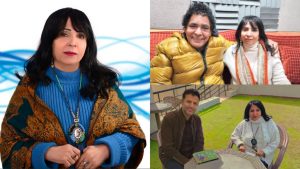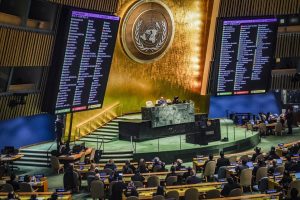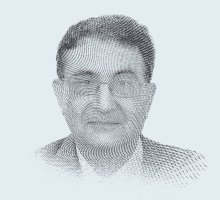كاتب ليبي؛ صحافي وقاص وروائي ومترجم. نشر مقالاته وقصصه القصيرة في الصحف الليبية والعربية منذ منتصف السبعينات. صدرت له مؤلفات عدة؛ في القصة القصيرة والمقالة، ورواية واحدة. عمل مستشاراً إعلامياً بالسفارة الليبية في لندن.
انتهت مساء يوم الجمعة الماضي القمة الثنائية الروسية – الأميركية في ألاسكا، وغادر الرئيسان الأميركي دونالد ترمب والروسي فلاديمير بوتين قاعة الاجتماع متفائلَين بإمكانية الوصول إلى حلّ للأزمة في مستقبل قريب. ذلك التفاؤل قوبل بالانتقاد الشديد من قبل القادة والإعلام الغربي. وتعرض الرئيس ترمب بشكل خاص لنقد إعلامي شديد.
اللقاء بين الرئيسين، في رأيي، استكشافي، لا يختلف عن إلقاء حجر في مياه بركة راكدة وآسنة، على أمل فتح باب ظل موصداً بأقفال عدة.
الرد الأوروبي على نتائج القمة جاء مرحّباً بالقمة الثنائية، ومؤكداً على دعم أوكرانيا وضرورة وجود ضمانات أمنية لمنع تكرار غزو روسي بعد التوصل لاتفاق لوقف النار. بريطانيا وألمانيا وفرنسا وإيطاليا أعلنت تأييدها لمسار السلام، في حين أن بولندا وتشيكيا والنرويج حذّرت من نيات بوتين. ومن جهتها، أعربت المفوضية الأوروبية عن ضرورة وجود الضمانات الأمنية لتحقيق سلام دائم. ومن المهم الإشارة إلى أن ترمب تعهّد بتوفير ضمانات أمنية أميركية لأوكرانيا لا علاقة لها بحلف الناتو، إن قبلت حكومة كييف التوقيع على اتفاق سلام.
الإعداد للقمة الثنائية، استناداً إلى تقارير إعلامية بريطانية، بدأ منذ شهر يناير (كانون الثاني) الماضي. حيث اتضح أن الرئيسين كانا على تواصل هاتفي شهريّاً. وفي شهر فبراير (شباط) التقى وزيرا خارجية البلدين في الرياض. وفي شهر أبريل (نيسان) التقى رئيس الصندوق السيادي الروسي كيريل ديمتريف في واشنطن بالمبعوث الخاص للرئيس الأميركي ستيف ويتكوف. وخلال تلك الفترة كان الرئيس الأميركي على تواصل مع رئيس جمهورية روسيا البيضاء ألكسندر لوكاتشينكو. وتضيف التقارير أن مكالمات الرئيس ترمب الهاتفية الأخيرة كانت معه يوم الجمعة الماضي قبل مغادرته إلى ألاسكا.
حدث كل ذلك، في وقت كانت المعارك على كافة الجبهات الحربية متواصلة. قبل يومين تقريباً من القمة في ألاسكا، استناداً إلى تقارير إعلامية غربية، تمكنت القوات الروسية من إحداث خرق تكتيكي في الدفاعات الأوكرانية في جنوب دونتسيك وتقدمت مسافة 10 كيلومترات تقريباً. وبعد ختام القمة، وقبل وصول طائرة الرئيس الأميركي إلى ميريلاند، نقلت وسائل الإعلام خبر غارة جوية روسية بعدد 80 طائرة مسيّرة على ثلاث مدن أوكرانية.
الغارة الجوية الروسية أثارت استنكار دول أوروبا وريبتها في نيات موسكو، واعتبرتها أوضح إشارة لعدم رغبتها في السلام. لكن من جهة أخرى، فإن الغارة الجوية الروسية نسخة مكررة مما حدث في سبعينات القرن الماضي في مباحثات السلام بين وفدي أميركا وفيتنام في باريس. إذ حرصت الإدارة الأميركية آنذاك على دعم وفدها في المفاوضات بالقيام بموجة من أعنف الغارات الجوية لتطويع الوفد التفاوضي الفيتنامي. وبالتالي، فإن الغارة الجوية الروسية ليس ابتكاراً روسيّاً.
الرئيس الروسي بوتين، خلال المؤتمر الصحافي أعاد تأكيده مجدداً على ضرورة معالجة الأزمة من جذورها. وأن تؤخذ كل مصالح روسيا في الاعتبار، وأن يحترم ميزان القوى. بجذور المشكلة قصد الرئيس الروسي وقف محاولات أوكرانيا الانضمام لحلف الناتو. وقصد بمصالحها تأكيد أحقيتها في كل الأراضي الأوكرانية التي احتلتها قواته، والتي يتحدث ساكنوها اللغة الروسية. وقصد باحترام ميزان القوى احترام مناطق النفوذ التاريخية لروسيا، حسب اتفاقية يالطا.
ومن جانبه، عارض الرئيس ترمب بشدة الطلب الأوكراني للانضمام للحلف، وأوصد الأبواب أمام أوكرانيا، إلا أن دول أوروبا بقيادة بريطانيا وفرنسا وألمانيا تصرّ على حق أوكرانيا كدولة مستقلة في سيادة قرارها، بزعم أن منعها من تحقيق ذلك يعد إنقاصاً لاستقلالها ولسيادتها!
المعلقون الغربيون يقولون إن الرئيس ترمب يريد للجميع القراءة من الصفحة نفسها التي يحملها، وهي وقف الحرب والقتل، من دون التعرض لأسباب الحرب، ورغبة روسيا في إخضاع أوكرانيا. وإن كل ما يهمه تعزيز سعيه للحصول على جائزة نوبل للسلام.
الثغرة في الجدار التي فتحها الرئيسان الروسي والأميركي بلقائهما في ألاسكا تحوّلت بين يوم وليلة، إلى متاهة ثلاثية الأبعاد: ما يريده الرئيس ترمب، تقابله مطالب الرئيس الروسي بوتين، مضافاً إليها محاذير ومخاوف أوكرانيا وحلفائها الأوروبيين من خطر تمدد روسيا في أوكرانيا بمباركة من واشنطن.
اتفاقات السلام في العادة ما لم تكن مدعومة بنصر عسكري نهائي تخضع لمبدأ التنازلات من جميع الأطراف ذات الصلة. واتفاقات السلام السيئة عادة ما تفضي إلى حروب في المستقبل. وإلى حدّ الآن، لم تبدِ أطراف الأزمة ما يشير إلى رغبة أي منها في تقديم تنازلات، أو قدرة على حسم الأمر في ميادين المعارك. الأمر الذي أوقع الرئيس ترمب في متاهة قد تفضي به إلى نفض يديه من الأمر كلية.













Recommended for you
مدينة المعارض تنجز نحو 80% من استعداداتها لانطلاق معرض دمشق الدولي
طالب الرفاعى يؤرخ لتراث الفن الكويتى فى "دوخى.. تقاسيم الصَبا"
تقديم طلبات القبول الموحد الثلاثاء و640 طالبا سيتم قبولهم في الطب
البريد المصري: لدينا أكثر من 10 ملايين عميل في حساب التوفير.. ونوفر عوائد يومية وشهرية وسنوية
سمو الشيخ عيسى بن سلمان بن حمد آل خليفة يستقبل سفير الولايات المتحدة الأمريكية لدى مملكة البحرين
الجغبير: القطاع الصناعي يقود النمو الاقتصادي